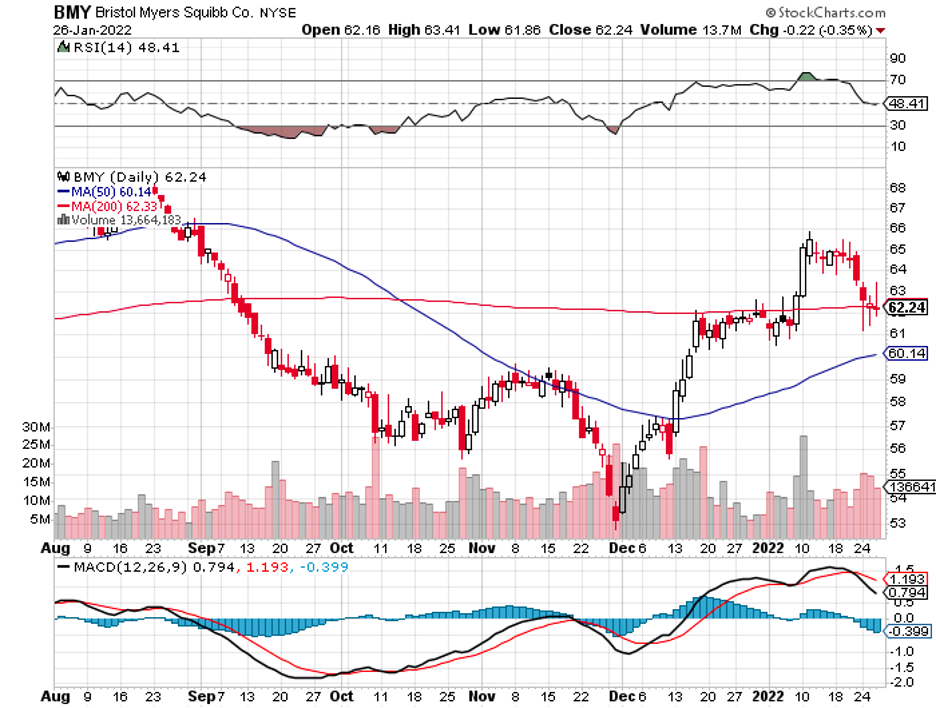A Blue-Chip Stock Poised for More Growth
What I’m about to share with you isn’t the most pleasant news, but it’s the truth.
You need to prepare for a stock market crash or a steep correction in the near future.
Since the early 1950s, the S&P 500 benchmark has experienced a total of 38 double-digit percentage declines.
While Wall Street doesn’t necessarily follow these trends, it’s vital to understand and accept that crashes and corrections will always be staples of the investing cycle.
On the flip side, these kinds of dips in the market also offer remarkable opportunities to buy high-quality businesses at a discount.
One of the wisest decisions you can make if the stock market does crash soon is to pick up shares of biopharmaceutical company Bristol Myers Squibb (BMY).
The allure of most healthcare and biotechnology stocks is that they make for good defensive investments.
We can never really fully control or even predict when we’ll get sick or what kinds of diseases we’ll develop.
That means that the volatility of the stock market or even the broader economy tends to have minimal effect on the demand for prescription treatments, medical devices, and healthcare plans.
This type of assurance offers a steady cash flow to the likes of BMY.
However, the healthcare industry continues to evolve. That also requires adjustments from companies regardless of their size and history.
Recently, there have been talks of BMY acquiring Seagen (SGEN), with investors hoping this could lead to an added revenue stream. After all, company executives have been hinting at plans to do some “shopping” this year.
While BMY has never shied away from massive acquisitions, it looks like it plans to expand its portfolio more conservatively as opposed to making splashy deals.
The latest move from BMY towards that direction is its licensing agreement with Century Therapeutics (IPSC).
According to the agreement, BMY will pay Century $100 million upfront and invest an additional $50 million to gain access to four of the smaller company’s off-the-shelf cancer therapies.
Potentially, Century could receive up to $3 billion from BMY in milestone payments on top of double-digit royalties.
Although not a splurge by any means, this deal would actually be an excellent addition to BMY’s cell therapy portfolio.
One potential treatment that would benefit from this licensing agreement is lymphoma therapy Breyanzi, which is estimated to get a list price of $410,000 and peak sales of roughly $3 billion.
Another is multiple myeloma treatment Abeam, which is expected to be listed at $419,500 and reach peak sales of approximately $1 billion.
Besides being a top-quality defensive play, BMY is excelling at taking advantage of its plan to combine organic with acquisition-based expansions.
In terms of organic growth, a good example is its blood-thinning treatment Eliquis, which BMY developed with Pfizer (PFE). In 2021, this drug raked in an impressive $10 billion in sales.
Another example is its cancer treatment Opdivo, which contributed $7 billion in 2020 and holds the potential to exceed $10 billion in annual sales given the continuous expansion of its applications.
In terms of acquisitions, BMY’s last huge acquisitions are the $13.1 billion deal with MyoKardia and, of course, the jaw-dropping $74 billion agreement with Celgene.
Looking at how the acquisitions helped BMY, saying that the company landed a whale when it acquired Celgene is an understatement.
Considering that Celgene’s Revlimid is the highest-grossing drug in BMY’s portfolio today, it’s apparent that these deals have proven to be a fast, albeit costly, strategy to guarantee that the company will continue to hold a diverse lineup of proven products with the capacity to provide consistent revenues and boost R&D.
Since that 2019 deal, the company has enjoyed the perks of Celgene’s blockbuster drugs like Revlimid, which has a proven track record of double-digit growth in annual sales and has recorded $15 billion in yearly revenue.
More importantly, Revlimid is protected from generics until 2026, offering BMY a lot of elbow room to take more advantage of the cash flow coming from this drug
Celgene has also provided an extremely valuable lineup of pipeline assets, apart from its blockbusters.
For instance, beta-thalassemia treatment Reblozyl holds the potential to bring in $2 to $4 billion in annual sales, while autoimmune medication Zeposia is projected to add $3 billion in yearly sales.
To date, it’s clear to see that BMY welcomed 2022 with promising momentum, and the healthcare stock should be anticipated to perform well in the first six months of the year.
Given its track record and projected trajectory, it won’t come as a surprise if this blue-chip stock soars above its competition this year.

